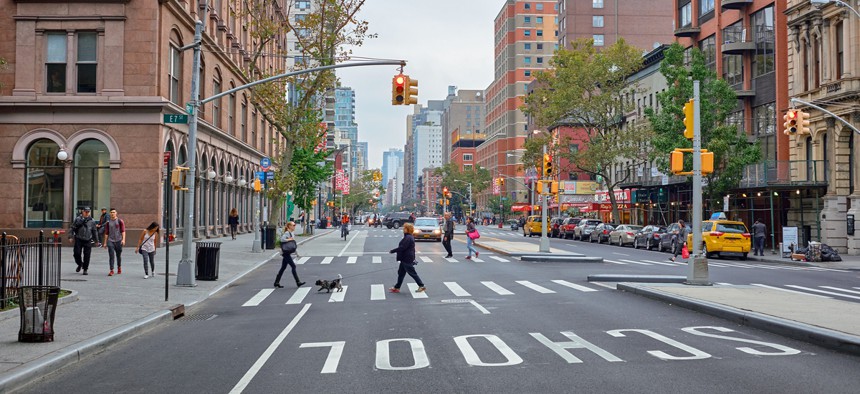How N.Y.C. Is Forging Strategic Partnerships to Address Its Affordability Crisis

Third Avenue in Manhattan Shutterstock
The city is already expanding access to computer science education and mental health treatment.
Mayor Bill de Blasio’s administration created the Office of Strategic Partnerships in 2014 on the heels of a campaign focused on alleviating New York City’s affordability crisis.
OSP looks to collaborate with the city’s civic-minded, charitable organizations to improve employment equity, among other problem areas, and found willing partners in The Robin Hood Foundation and venture capitalist Fred Wilson for one of its flagship projects, Computer Science for All.
About 54,000 New York City students, just under 5 percent, received a computer science education prior to the project’s creation, but the goal of the $81 million public-private partnership is to extend training to all 1.1 million youth in the nation’s largest school district.
“Private philanthropy and strategic partnerships allow us to try new models without risking public money,” Gabrielle Fialkoff, OSP director, told Route Fifty in an interview.
Computer science students tended to be white or Asian and boys, leaving other people of color and girls at a disadvantage entering the modern workforce.
The business community approached OSP about piloting Computer Science for All in several schools, and since launching in 2015, 1,000 teachers have been trained to teach the subject across 550 schools. Students taking the AP Computer Science exam have tripled in number, and the skills will be woven into other subject in the future.
As with all OSP partnerships, Computer Science for All has the potential to scale in the city’s budget, the current end goal being to train 5,000 teachers.
NYC Housing Help is another core OSP partnership focused on connecting low-income families facing eviction with legal services prior to their day in court.
“We found that we could keep people in their homes with proper representation,” Fialkoff said.
The project was scaled in the city budget along with New York City first lady Chirlane McCray’s $850 million mental health initiative ThriveNYC. Connections to Care—a partnership with the federal government and local nonprofits and mental health providers is a key component, delivering service to low-income, high-need communities.
Frontline nonprofits’ staff are trained in proven techniques to spot signs of distress and refer patients to mental health providers.
Already 1,000 nonprofit counselors have been trained and served 9,000 New Yorkers, referring them to further care, with plans to scale that number to 40,000 patients.
Mental health treatment is also viewed by City Hall as critical to improving criminal justice reform and reducing the jail population at Rikers Island, so it can be closed even sooner that the city’s 10-year timeline.
New York City also partnered with Unilever on an urban farming initiative to increase green space in neighborhoods.
“These are crime-fighting measures,” Fialkoff said. “These are drivers of health and wellness.”
Dave Nyczepir is a News Editor at Government Executive’s Route Fifty and is based in Washington, D.C.
NEXT STORY: So States Ban Bump Stocks. Now How Do They Enforce the Law?






